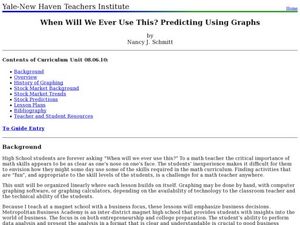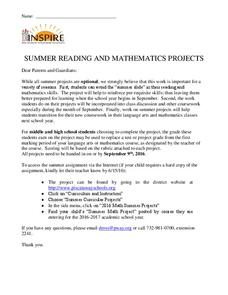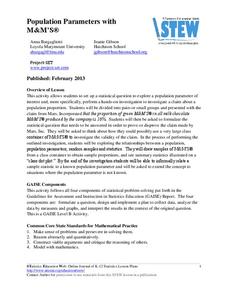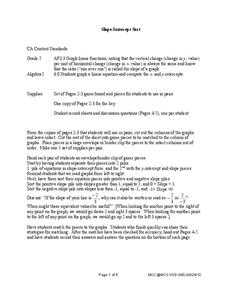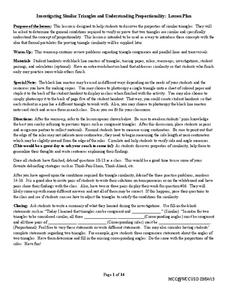Teach Engineering
Boxed In and Wrapped Up
If cubes have the smallest surface area, why aren't there more cube-shaped packages? Scholars take a box in the shape of a rectangular prism, cut it up, and make new boxes in the shape of cubes with the same volume. They then brainstorm...
Curated OER
Our Solar System - Comparing Planetary Travel Distances
NASA presents a mini-unit on distances in our solar system. It incorporates scientific concepts of gravity, mass, density, and payload while your aspiring astronauts also employ mathematics skills. They calculate speed, they determine...
PBS
Button, Button
Youngsters count, classify, and estimate quantities using buttons after a read aloud of The Button Box by Margarette S. Reid. They discuss the difference between guessing and estimating. Based on an experiment, they predict the number of...
Space Awareness
History of the Universe
Your pupils may believe that you and their parents are the oldest things in the universe, but surprise! There are elements of the universe that are even older. Elementary scientists create a class timeline to demonstrate the expansive...
Howard County Schools
Drawing Inverses
An Algebra II lesson draws the connection between the exponential function and its inverse. By graphing an exponential function and using tables and a calculator, students graph the logarithmic function. The plan comes with a launch,...
Utah Education Network (UEN)
Add a Quack, Quack Here
The teacher will read-aloud the book Quack and Count and call upon studens to demonstrate various sums of seven. They brainstorm a list of ideas of things that can be combined or added together. They are given unifix cubes to demonstrate...
Curated OER
Does Order Really Matter?
Investigate the order of operations! Learners participate in interactive multi-media activities to examine and solve multi-step equations, inequalities. They evaluate formulas and simplify monomials and polynomials.
Curated OER
Making Connections: Matrices, Graph, Linear Systems
In this set of activities, matrices and equations are explored. They work with matrices using pen and paper as well as graphing calculator. Additionally real-world problems are explored.
Curated OER
When Will We Ever Use This? Predicting Using Graphs
Here are a set of graphing lessons that have a real-world business focus. Math skills include creating a scatter plot or line graph, fitting a line to a scatter plot, and making predictions. These lessons are aimed at an algebra 1 level...
Curated OER
AM I on the Radio?
Students create a working radio by soldering circuit components supplied from an AM radio kit. They demonstrate an efficient soldering technique, identify the circuit components used to construct their radio, and explain how their radio...
Piscataway Township Schools
Bake Sale
Here is a project that instructs young bakers to calculate the ingredients needed for a cookie bake sale. The catch is that the ingredients for 32 cookies is given; however, pupils must figure out the amounts needed for 12 and 60...
Visa
In Trouble
What are some of the financial risks associated with using credit? Pupils learn the warning signs of incurring financial hardship, and through PowerPoint presentations, worksheets, and discussion, discover the implications of such events...
Curated OER
Telling Time Lesson Plan
Judy Clocks are a great invention. Here, learners review telling time to hour and half hour on Judy clocks, begin telling time to quarter hour, use clock stamps to practice, and play computer games using Trudy's Time and Place House...
Curated OER
Are You Full of Hot Air?
Explore the concept of measuring and recording circumference. In this physical science and measurement lesson, young learners blow up balloons, measure the circumference, and record the data on an interactive graphing website.
Curated OER
Comparing and Ordering Fractions, Mixed Numbers, and Decimals
Create your own fraction kits by folding and labeling paper using fraction vocabulary. Learners then work in groups to use these in comparing and sequencing both whole numbers and fractions. They also create unit cubes and develop an...
Statistics Education Web
Population Parameter with M-and-M's
Manufacturers' claims may or may not be accurate, so proceed with caution. Here pupils use statistics to investigate the M&M's company's claim about the percentage of each color of candy in their packaging. Through the activity,...
GLOBE Program
Calculating Relative Air Mass
Combine math and science with fun in the sun! Scientists build a solar gnomon using reusable materials to calculate relative air mass. Mathematicians measure the pole's shadow and use the data to solve for relative air mass....
West Contra Costa Unified School District
Slope-Intercept Sort
What's so special about slope? Pupils first match cards with slope and y-intercept to graphs of linear equations. They continue the lesson by matching equations in slope-intercept form to the same graphs.
West Contra Costa Unified School District
Investigating Similar Triangles
Let your use of the resource be in proportion to its usefulness. Pupils investigate similar triangles by measuring side lengths and considering given angle measures. The results of the investigation help develop generalizations about...
Curated OER
House Project
Make young mathematicians' dreams a reality with this fun drawing project. Given the task of designing their dream home, students create drawings and physical models that demonstrate their understanding of proportion and scale.
Utah Education Network (UEN)
Solving Single-Variable Equations Part II
Brainiacs explore the concept of solving single-variable equations.They use inverse operations to solve equations, and participate in activities such as balancing an equation scale. This is an awesome lesson plan, complete with game...
Curated OER
Household Conservation/Efficiency
Hook your class up to an online home energy usage calculator so that they can estimate the amount used per month by their families. Then give them Watt meters with which they will measure the power consumption of several small...
American Statistical Association
Exploring Geometric Probabilities with Buffon’s Coin Problem
Scholars create and perform experiments attempting to answer Buffon's Coin problem. They discover the relationships between geometry and probability, empirical and theoretical probabilities, and area of a circle and square.
Illustrative Mathematics
Heads or Tails
Heads! A great way to practice probability is to flip a coin in class. The provided data allows your mathematicians to predict the probability of heads in ten coin flips. Bring coins to class and allow your own trial of heads or tails....










